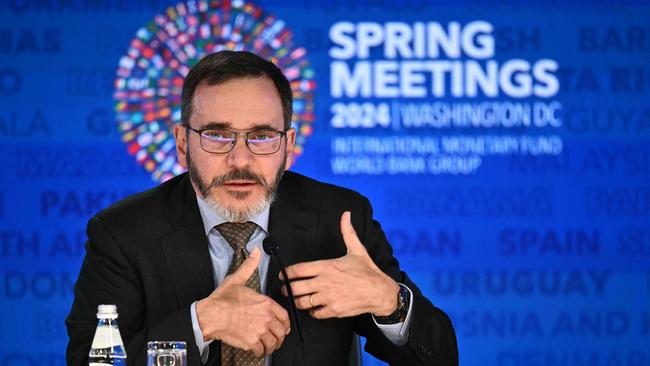Tariffs risk derailing global gains, IMF warns
A global tilt towards greater industry protectionism risks undermining global progress on climate change, according to the International Monetary Fund.

A global tilt towards greater industry protectionism risks undermining global progress on climate change, according to the International Monetary Fund, which has also warned persistent inflation across advanced economies is likely to delay rate cuts.
Releasing the IMF’s latest World Economic Outlook on Tuesday, chief economist Pierre-Olivier Gourinchas sounded the alarm on the “gradual dismantling of our multilateral trading system” through the imposition of unilateral tariffs alongside new industrial policy measures.
“Our imperfect trading system could be improved, but this surge in unilateral measures isn’t likely to deliver lasting and shared global prosperity,” Professor Gourinchas said. “If anything, it will distort trade and resource allocation, spur retaliation, weaken growth, diminish living standards, and make it harder to co-ordinate policies that address global challenges, such as the climate transition.”
He said efforts should be directed to “sustainably improving medium-term growth prospects through more efficient allocation of resources within and across countries” through spending on innovation and education.
His view follows concerns voiced by Productivity Commission chair Danielle Wood, who in April cautioned that the Albanese government’s Future Made in Australia intervention would “take jobs and capital investments from elsewhere in the economy where they could generate higher value”.
Spurred by the pandemic and an increasingly expansionist China, Western economies have unleashed a flood of subsidies for green and hi-tech industries to transition to net zero and build economic resilience.
The trend has up-ended a decades-long embrace of global free trade, with Anthony Albanese in April unveiling his Future Made in Australia agenda by declaring that “the role of government needs to evolve”.
The nation’s off-budget funds – the $20bn Rewiring the Nation Fund, $15bn National Reconstruction Fund, and $4bn Critical Minerals Facility – will all be tapped under the Future Made in Australia program.
Under the policy, government will invest in projects to support the net-zero transition and improve economic security via subsidies, tax credits and loans. Solar panel manufacturing and quantum computing development have already received a $1bn in taxpayer funds via the plan.
Meanwhile, the Washington-based fund also cautioned that inflation was proving stubbornly persistent, with continued pressures in the labour-intensive services sector.
“In some advanced economies, especially the United States, progress on disinflation has slowed, and risks are to the upside,” Professor Gourinchas said. “Further challenges to disinflation in advanced economies could force central banks … to keep borrowing costs higher for even longer.”
Australia, like the US through much of the first half of the year, has displayed minimal progress in taming stubborn price pressures. Inflation has tracked sideways since the end of last year, re-accelerating to a six-month high of 4 per cent in May.
The IMF’s warning comes amid fears the Reserve Bank will hike at its August meeting with investors ascribing a near 13 per cent chance of a quarter point increase. Markets are fully priced for a reduction by next May.
With persistent inflation putting overall growth at risk, IMF economists also downgraded Australia’s GDP growth projection to 1.4 per cent for 2024, down from 1.5 per cent projected in April. The fund retained its 2025 forecast of 2 per cent.
Global growth projections were unchanged at 3.2 per cent in 2024, moving to 3.3 per cent in 2025, up 0.1 percentage points.
Jim Chalmers said the report was a clear reminder that inflation was “lingering all across the globe”.
“The report rightly highlights that uncertainty in the global economy in areas like international trade are contributing to inflationary pressures all over the world and Australia is not immune to those pressures,” the Treasurer said.



To join the conversation, please log in. Don't have an account? Register
Join the conversation, you are commenting as Logout